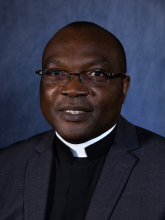
All baptized persons have rights within the society of the Church. The Tribunal exists to vindicate these rights and to serve truth.
Jesus said, "What God has joined together, no one must separate." Catholics do not believe that a civil divorce decree ends a marriage; it merely terminates the legal effects of marriage. The Tribunal's ministry to separated and divorced persons is to uphold and preserve the integrity of the Sacrament of Matrimony.
There are few aspects of Catholic life that raise as many questions and concerns as the annulment process. There are also very few aspects of Church life that touch so many lives in such an intimate way.
The annulment process is intended to be an extension of the healing and reconciling ministry of Jesus Christ toward those who have experienced an unsuccessful marriage. It is also an opportunity for both parties in a marriage to look at themselves, their marriage and the future and evaluate these realities in light of the Gospel.
Marriage
What is marriage?
The Catholic Church teaches that marriage is a permanent partnership between a man and a woman for the giving and receiving of love and the procreation and education of children.
Is marriage a sacrament?
Yes, if both parties are baptized, a valid marriage is at the same time the Sacrament of Matrimony.
Can persons of other religious Christian denominations also receive the Sacrament of Matrimony?
Yes, any two people who are validly baptized receive the Sacrament of Matrimony through their exchange of consent in a valid marriage.
What about a marriage involving one or both of the parties who are not baptized?
Although such a marriage is not considered a sacramental marriage, it is presumed to be a natural, valid marriage by the Catholic Church because the nature and purpose of marriage is the same for all humans.
How can the Church declare a presumably valid marriage null and void?
The Church defines marriage as a covenant by which a man and woman enter into a communion of life and love with each other. Marriage, by its nature, is ordered towards the good of the spouses and the procreation and education of children.
Jesus taught that marriage is indissoluble. Once you marry, you are married until the death of one of the spouses. Even if you have a valid reason to separate, a marriage which is valid remains so. For a marriage to be valid, it is not enough that the two spouses went through the motions or had good intentions. There are certain marriages that are invalid from the start. They have the outward appearance of a marriage but because of some impediment, some defect of consent, lack of freedom due to fear or coercion, or some problem with the form of the marriage, they are not valid marriages.
Is the Catholic Church compromising its traditional stand on the sacredness and permanence of marriage by granting so many annulments?
By no means! The indissolubility of the Sacrament of Marriage remains a central Catholic teaching. But, while carefully protecting Jesus' teaching of the sacredness of marriage, the Church in justice must examine the validity of a marriage when one or both of the spouses has a legitimate question. Whenever it can be shown beyond a reasonable doubt that a marriage was invalid, the Church upholds the sacredness and permanence of marriage by acknowledging that a marriage never in fact took place.
The Marriage Tribunal
What is the Tribunal?
The Marriage Tribunal is part of the judicial structure of the Catholic Church. The day-to-day work of the Tribunal is supervised by the Judicial Vicar who is appointed by the Bishop. He must be a priest who is educated in the law of the Church. Other officials of the Tribunal are the Judges, Defenders of the Bond, Promotors of Justice, Auditors, Advocates and Ecclesiastical (Church) Notaries.
What is the purpose of the Tribunal?
Any person who believes that his or her marriage is not valid has the right to challenge its validity. The purpose of the Marriage Tribunal is to undertake the proper investigation of the marriage which is questioned in order to determine the truth concerning that marriage.
Unlike a civil divorce proceeding, which is often contentious and painful, the annulment process should be a moment for healing and grace, regardless of the outcome.
The marriage nullity process is a judicial process developed over the centuries to allow people who believe that their marriage was invalid to attempt to prove that fact. It safeguards the rights of both parties and upholds the dignity and indissolubility of marriage. A declaration of nullity does not and cannot dissolve an existing marriage; rather it is an official declaration by the Church that it has been proven beyond a reasonable doubt that a given marriage was invalid from the start. When a marriage is invalid, the declaration of nullity is good and just because it recognizes the truth.
Can anyone obtain a Church annulment?
No. Each case is decided on its own merit. There must be grounds for nullity recognized in Church law. These grounds must be proven to the satisfaction of the judge who is directed by the requirements of the law regarding what constitutes proof. If after examining the gathered evidence the judge believes that he has obtained moral certitude, he may declare the marriage null and void from its inception.
The Annulment Process
Preliminary Steps
Who may petition for an annulment?
Usually it is a Catholic party or another who wishes to marry a Catholic who would petition the Church for an investigation into the possible nullity of a prior marriage.
When can I petition the Tribunal?
The Tribunal can be petitioned at any time following the civil divorce.
Can I petition to any Tribunal?
Only the Tribunal which has jurisdiction can accept and process a petition for nullity. Jurisdiction is determined by the place where the marriage occurred or by the residence of the former spouse (respondent). The diocese where the applicant (petitioner) resides can obtain jurisdiction with the written or tacit permission of the respondent and of the Tribunal where the respondent resides. If the whereabouts of the respondent is unknown and cannot be obtained, the Tribunal where the marriage occurred or w here the petitioner resides has jurisdiction.
How do I go about making such a petition?
The petitioner would normally make an appointment to see the local Catholic priest or pastoral administrator. He or she will provide the "Formal Petition" form and assist in its being properly completed. The petitioner also has the option of petitioning t he Tribunal directly if he or she has a good reason for doing so. This can be arranged by telephoning the Tribunal Office.
Do I need to present any additional documentation to the Tribunal other than the petition?
Yes. A copy of the civil marriage record and civil judgment of divorce must accompany a petition. In addition, recent baptismal certificates for both the petitioner and respondent should be included (if applicable and obtainable). The unexplained absence of these documents will prevent the opening of the case.
Do I have to appear in person at the Tribunal office?
Yes. After your petition has been submitted and reviewed, an appointment will be arranged for you to meet with a Tribunal official. The purpose of this interview is to enable you to ask any questions that you may have. The interview also affords us the opportunity to ask you for additional information and/or clarifications.
What do I have to do after I have been interviewed?
The rest of the process is pretty much in the hands of the Tribunal. We will quietly conduct our investigation while you go about your business. However, if we need your assistance we will contact you. Be sure to notify the Tribunal if you have a change o f address.
Does my former spouse have to be contacted?
Yes, the respondent has a right according to Church law to be informed of the petition and given an opportunity to testify on his or her own behalf. The respondent also has a right to know of the alleged grounds for nullity.
What if my former spouse does not cooperate in the process?
It depends on the nature of the case in question. The respondent's testimony is very important for a balanced view of the marriage. Usually, if the testimony of the witnesses is quality testimony, the case can be concluded successfully without the respondent's testimony. However, every reasonable effort is made to be sure that the respondent is given a chance to present his or her perspective of why the marriage failed.
Pope Francis has created a new, shorter process, and, if your former spouse does not cooperate, it will not be possible to use this process.
Are witnesses necessary?
Absolutely! The Tribunal will ask both parties of the former marriage to provide names and addresses of people who are available to assist the Tribunal in determining whether the invalidity of the marriage can be proven.
Witnesses should be chosen on the basis of their ability to be objective, on their knowledge of the facts and on their knowledge of one or both parties. These could include parents, family members, friends or counselors. Before their names are submitted t o the Tribunal, they must agree to your request to cooperate in the Tribunal process.
How do the witnesses provide testimony?
Once the witnesses have given their consent to cooperate in the process and once the case is accepted, the Tribunal will mail them the material to guide them in writing their reflections and insights concerning the marriage. If absolutely necessary, the witnesses will be invited to come to the Tribunal Office to give personal testimony.
What about professional witnesses?
Sometimes doctors, psychiatrists, psychologists, professional counselors, priests, ministers, etc. have been consulted before or during a marriage in order to assist a person or a couple. If so, you may be asked to sign a form which releases these professional witnesses from confidentiality. These witnesses are often very valuable in the study of the marriage in question.
Study & Conclusion
What is the next step?
When the statements of the witnesses and of the respondent have been gathered, an evaluation of the gathered material is made by the officials of the Tribunal. It is at this time that a determination is made whether there is sufficient information to conlude the case.
If the case is concluded, you and your former spouse have the right to read the case, except for testimony which was specifically designated by a witness to be absolutely confidential. An appointment must be made to review the case. This must be done in t he Tribunal office. No material from the case may be removed or copied!
When is a decision made?
Once the case has been concluded, the Tribunal officials offer their reflections. A decision is then rendered by the assigned judge in the case. When the decision is rendered, you are notified in writing.
If either party or the Defender of the Bond is not in agreement with the decision, the law provides for an "appeal." The request for an appeal must be made in writing to the Tribunal Office within fifteen (15) working days from the date of the sentence notification letter.
What happens after an annulment is granted and no appeal is made?
When neither party nor the defender of the bond nor the Promotor of Justice appeals an affirmative decision (in favor of the nullity of the marriage) within fifteen days from the notification of the sentence, it can be carried out.
If an annulment is granted, does that mean both parties can remarry?
In most cases yes. However, in some cases there may be conditions which either or both parties must fulfill before a Catholic marriage can take place. The Church wants to be reasonably certain that the same factors which caused the invalidity of the previous marriage are no longer present.
In some cases, the Tribunal might require professional counseling or an evaluation by a priest or counselor to verify that both parties have the proper intentions and are capable of assuming the obligations and responsibilities of marriage.
General Information
Does an annulment have any civil effects?
NO! All of the civil effects of the divorce should have been settled in the civil courts; therefore, the Church annulment has no effect on child support, property rights, alimony, etc.
Does an annulment affect the legitimacy of children?
NO! The Church considers the children to be a gift from God. Therefore, the law of the Church states that children born of a marriage that is later declared to be invalid are legitimate. Children cannot lose their legitimacy!
Is there a fee for Tribunal services?
No, not in the Gaylord Diocese. The cost of processing a case is paid for from funds collected during the annual Catholic Services Appeal (CSA). All members of the diocese are encouraged to support the work of the Church by contributing to the Catholic Services Appeal. No one is denied or discriminated against who is unable to make a contribution to CSA.
How long does it take to complete a marriage case?
The investigation process itself is not long or complicated. However, the great number of cases that are always before the Tribunal means that it takes an average of ten months to one year to process a case to completion.
Is an annulment always granted?
No. If the judge believes that the grounds have not been proven with moral certitude, a negative decision is given. This means that the validity of the marriage must be upheld.
Are there some cases which are never able to be completed?
Yes. Sometimes the witnesses will not cooperate or sometimes they are not knowledgeable enough to be of any real help to the case. If this cannot be rectified, a "Decree of Abandonment" is given.
Is a divorced person excommunicated from the Church?
NO! A Catholic is not excommunicated when he or she is divorced. A divorced person is fully and completely a member of the Church.
Can a divorced person receive communion?
Yes. There is nothing in itself that prevents a divorced Catholic from receiving the Eucharist and the Sacrament of Penance. The issue for receiving Communion is not the divorce but any subsequent actions such as a civil marriage or living together.
General Information Regarding the Changes Made by Pope Francis
On Tuesday, September 8, 2015, Pope Francis issued Mitis Iudex Dominus Iesus [The Gentle Judge, our Lord Jesus], a document revising the marriage nullity process.
Why did Pope Francis change the marriage nullity process?
Pope Francis teaches exactly what Christ taught: that marriage is indissoluble. Indissolubility is part of the Good News! It tells us that God wants us to love and be loved unconditionally, and that He made us capable of that kind of love. Nothing that Pope Francis has said or done has changed or could change any of that. There is nothing merciful in calling a marriage invalid when it is really just broken, or in declaring that a marriage is probably invalid even when real doubt remains. His concern is not to have more “annulments” regardless of the truth of the matter, but to eliminate any unnecessary barriers towards obtaining a just and prompt judgment. He also wants to minimize as much as possible the amount of time people spend in a state of uncertainty while their case is pending.
How has the marriage nullity process changed?
The document contains a number of “tweaks” to the process, but there are five major changes: (1) new rules for tribunal competence, (2) new requirements for tribunal personnel, (3) the elimination of the requirement for a second affirmative decision, (4) a shorter and more streamlined process, judged personally by the Diocesan Bishop, for certain rare and exceptional cases, and (5) a move towards eliminating the cost to you of seeking a declaration of nullity.
When did these changes take effect?
The revised law took effect on December 8, 2015, three months after its release.
How do the changes in the rules for competence affect me?
Previously, if you lived in a different Diocese than your former spouse, it was necessary to get the permission of that Diocese for your Diocese to hear the case. If you lived in places with different Conferences of Bishops (for instance the U.S. and Mexico) you had to get permission from Rome. These changes will eliminate a step that added time to the process.
What are the requirements for tribunal personnel, and how have they changed?
Marriage nullity cases are normally tried before a “college” of three judges, all of whom meet to decide whether or not the marriage is proven invalid, but only one of whom (the judge ponens) is responsible for most of the day-to-day handling of the case. In the past, only one of the three could be a layperson. The college of three judges will remain the norm under the new law, but now up to two of them can be lay people. Where there is only one judge, as is normally the case in the Diocese of Gaylord, he must still be a priest.
Why was there a requirement of a second conforming affirmative decision?
In the past, when there was more intermingling of Church and State, there was the very real possibility that an important civil official could place undue influence upon the Church in order to grant a declaration of nullity. Because of this the Pope decided that every affirmative decision had to be reviewed and upheld by a second tribunal. As time passed, and that became less likely, their main role was to verify that the decision had been properly arrived at, and that no errors were made, and no rights violated.
As an extra protection against unfounded declarations of nullity, an affirmative decision did not become “executive” (meaning that the parties could act on it) unless it was upheld on the same ground by an appellate tribunal. This requirement held even when nobody appealed the sentence. This requirement added several months beyond the time that it took for the original tribunal to make its decision.
Also, if there was a disagreement between the original tribunal and the appellate tribunal (affirmative/negative or negative/affirmative), the case has to be heard by a second appellate tribunal, and this potentially added years to the process, as, in most of the world, the only place to hear the second appeal was Rome.
What does it mean that the requirement of a second affirmative decision is eliminated?
Under the revised law, when neither party nor the defender of the bond nor the Promotor of Justice appeals an affirmative decision (in favor of the nullity of the marriage) within fifteen days from the notification of the sentence, it becomes executive. That is true at the first instance level or at any appellate level: one un-appealed affirmative sentence definitively establishes the nullity of the marriage.
In the event that there is a negative decision that you or your former spouse appeals, and on appeal the decision is again negative, the process has not changed, and the normal possibilities for further appeal are extinguished.
What happens if there is an appeal to the tribunal’s affirmative decision?
That depends on who makes the appeal and the reason for it. In the past, the fact that someone appealed compelled the appeal tribunal to hear the case anew. The Holy Father recognizing that sometimes an appeal is used merely as a delaying tactic has enabled the appeals tribunal to reject the appeal if there is no obvious reason for it. If the appeal is accepted, then you must await their decision before you can act upon the original affirmative decision.
What about the so-called “lack of form” annulment?
This is not technically an annulment, since it is an administrative verification of facts: namely that a Catholic married outside of the Church without a dispensation. It is not a juridical process, and, once all the documents have been received and verified it can be granted immediately.
What is the new Process before the Bishop (shorter process)?
While the vast majority of cases where the invalidity of the marriage is obvious will be of the documentary type, or else lack of form, there are certain cases—rare and exceptional—in which all the relevant facts are readily available and clearly demonstrate the nullity of the marriage. In such cases, some of the more time-consuming formalities of the ordinary process could safely be omitted without compromising the integrity of the process. For cases such as these, Pope Francis created a new, shorter process.
Who qualifies for the process before the Bishop?
The process before the Bishop is the name that all the marriage tribunals in the State of Michigan have given to the “shorter process.” Three strict conditions must be met (1) Both spouses have to petition for it together, or the other party must at least consent to it. (2) The nullity of the marriage must be obvious. (3) All the facts that make the marriage obviously null have to be readily available. Unlike the documentary process, the process before the Bishop can involve the questioning of both parties and knowledgeable witnesses, but this is to be done all in one session whenever possible. If any of the three conditions are missing, the case cannot be submitted for this process, but must use the ordinary process.
How does the process before the Bishop work?
First, the parties (or one of them with the consent of the other) have to submit a petition for a declaration of nullity, which in addition to all the information normally contained in a petition, has to demonstrate why this process could be used, i.e., why the nullity of the marriage is manifest and also how it will be proven by readily available evidence. If the case is admitted to the process before the Bishop, the Judicial Vicar issues a decree stating the grounds in the case, nominating an instructor (an official in charge of gathering the evidence) and an assessor (an official in charge of advising the Bishop) and within thirty days citing them along with the parties and the Defender of the Bond to come to a session at the tribunal. At that session, the parties will be questioned along with their witnesses, and other evidence may be presented. Afterwards, the Defender of the Bond and the parties have fifteen days to present their closing arguments in the case, at which point the whole case is presented to the Bishop for judgment. If, based on all the evidence presented, he is certain beyond a reasonable doubt that the marriage is invalid, he can issue a sentence declaring the nullity of the marriage. If he is not morally certain, the case is returned to the normal process. Appeal against the Bishop’s affirmative decision can be made by either party or the Defender of the Bond or Promotor of Justice within fifteen days to the Archbishop of Detroit (the Metropolitan of the Ecclesiastical Province in which the Diocese of Gaylord is located) or to the Dean of the Roman Rota.
Do I qualify for the process before the bishop?
If your case is submitted on or after December 8, 2015, and if the Judicial Vicar determines that you meet all of the 3 criteria, then yes. In any case, just because the Judicial Vicar decides that your case qualifies for the process before the Bishop there is no guarantee that the Bishop will grant a declaration of nullity.
Why is it important for both spouses to agree to the process before the bishop?
If one of the spouses does not agree that the marriage was invalid, or does not agree about the reasons for its invalidity, then having a quicker process would violate his or her rights, even if the marriage were to be invalid.
Why do many tribunals currently charge for a declaration of nullity?
Because the annulment process is a technical legal process, the various professionals who are required to make a tribunal function require years of training, and, when they are lay people, they also have families to provide for. In justice those who have spent years in studies need to be compensated for their sacrifice. Even Pope Francis recognizes this reality; he simply does not want the cost of the process to stop anyone from undertaking it. In the Diocese of Gaylord, the cost of processing a case is paid for from funds collected during the annual Catholic Services Appeal (CSA). All members of the diocese are encouraged to support the work of the Church by contributing to the CSA. No one is denied or discriminated against who is unable to make a contribution to CSA.












